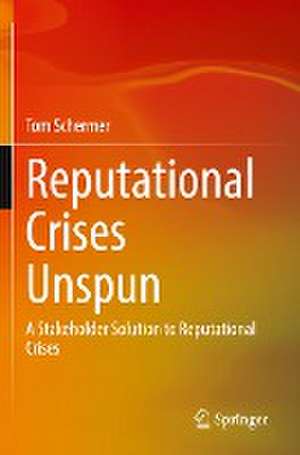Reputational Crises Unspun: A Stakeholder Solution to Reputational Crises
Autor Tom Schermeren Limba Engleză Paperback – 6 oct 2022
This book reviews dominant crisis communication theories, which according to many scholars are either too narrow or broad for practical application to all types of reputational crises. Freeman, as the progenitor of modern stakeholder theory, has spent much time since the original publication trying to remove the primary focus from companies to that of achieving broader positive outcomes for organisations, populations, and the operating environment. This book embraces the ethos of Freeman’s revisions and applies it to crisis communication through placing the reputational crisis at the centre of a stakeholder map, where other literature places the company at the centre of the stakeholder map. This leaves the company experiencing the crisis situated with all other crisis stakeholders to develop solutions to the source of conflict, and as a result, the reputational crisis.
Removing the corporation from the centre allows for other stakeholders such as interest groups,politicians, media, and afflicted stakeholders, to legitimately work towards solving the crisis. This book uses a typology of apologia and builds upon it to create a means that allows corporate managers to genuinely apologise to crisis victims, without necessarily exposing the corporation to financial liability claims. The apologia construct developed herein is equally useful to CEO’s as it is in a domestic situation.
Consistent throughout this book is the philosophy that all reputational crises can be either solved, or significantly reduced in terms of impact. Examples used throughout relate to reader’s personal lives as well as structured powerful organisations.
| Toate formatele și edițiile | Preț | Express |
|---|---|---|
| Paperback (1) | 691.45 lei 43-57 zile | |
| Springer Nature Singapore – 6 oct 2022 | 691.45 lei 43-57 zile | |
| Hardback (1) | 698.15 lei 22-36 zile | |
| Springer Nature Singapore – 5 oct 2021 | 698.15 lei 22-36 zile |
Preț: 691.45 lei
Preț vechi: 813.47 lei
-15% Nou
Puncte Express: 1037
Preț estimativ în valută:
132.31€ • 138.49$ • 110.12£
132.31€ • 138.49$ • 110.12£
Carte tipărită la comandă
Livrare economică 31 martie-14 aprilie
Preluare comenzi: 021 569.72.76
Specificații
ISBN-13: 9789811651328
ISBN-10: 9811651329
Pagini: 161
Ilustrații: XIX, 161 p. 19 illus., 2 illus. in color.
Dimensiuni: 155 x 235 mm
Greutate: 0.27 kg
Ediția:1st ed. 2021
Editura: Springer Nature Singapore
Colecția Springer
Locul publicării:Singapore, Singapore
ISBN-10: 9811651329
Pagini: 161
Ilustrații: XIX, 161 p. 19 illus., 2 illus. in color.
Dimensiuni: 155 x 235 mm
Greutate: 0.27 kg
Ediția:1st ed. 2021
Editura: Springer Nature Singapore
Colecția Springer
Locul publicării:Singapore, Singapore
Cuprins
Chapter 1. Introduction: What is a reputational crisis?.- 2. Crisis communication and reputation management.- 3. Reputational crisis stakeholders – fluidity in identities.- 4. Managing perceptions – media in reputational crises.- 5. Crisis communication and management challenges.- 6. Thinking differently: Reputational crises resituated.- 7. Best practice method of dealing with reputational crises.- 8. Crisis prevention.- 9. Crisis Preparedness Quiz.
Notă biografică
Tom Schermer has spent decades as a business owner and as an agent for various large corporations. In this he found that helping competing parties devise a mutually beneficial solution was the most effective and profitable way to resolve disputes. When later studying mass communication while completing a Bachelor in Journalism Tom noticed that the same conflict occurred between the stakeholders in news stories. With a hobby of investing in shares he saw the potential of reputational crises to make positive impacts on companies, stakeholders, and shareholders alike.
Taking his approach to resolving conflict with mutually beneficial outcomes, Tom enrolled in a PhD program researching reputational crises. Despite the volumes of literature on reputational crises, at best a few authors hinted at the possibility of changing the way things were done. Unwilling to write a thesis that supported ineffective theories, Tom combined everything he had learnedin research, business, communications, and relationships into this book with the view to improve how reputational crises are handled, and improve outcomes for everyone involved.
Textul de pe ultima copertă
This book reviews dominant crisis communication theories, which according to many scholars are either too narrow or broad for practical application to all types of reputational crises. Freeman, as the progenitor of modern stakeholder theory, has spent much time since the original publication trying to remove the primary focus from companies to that of achieving broader positive outcomes for organisations, populations, and the operating environment. This book embraces the ethos of Freeman’s revisions and applies it to crisis communication through placing the reputational crisis at the centre of a stakeholder map, where other literature places the company at the centre of the stakeholder map. This leaves the company experiencing the crisis situated with all other crisis stakeholders to develop solutions to the source of conflict, and as a result, the reputational crisis.
Removing the corporation from the centre allows for other stakeholders such as interest groups, politicians, media, and afflicted stakeholders, to legitimately work towards solving the crisis. This book uses a typology of apologia and builds upon it to create a means that allows corporate managers to genuinely apologise to crisis victims, without necessarily exposing the corporation to financial liability claims. The apologia construct developed herein is equally useful to CEO’s as it is in a domestic situation.
Consistent throughout this book is the philosophy that all reputational crises can be either solved, or significantly reduced in terms of impact. Examples used throughout relate to reader’s personal lives as well as structured powerful organisations.
Caracteristici
Offers literature review of crisis communication theories and shows the need for a new view point and refined concept Provides a wider scope of crisis communication theories and is suitable to more expansive reputational crises Highlights the importance of reputational crises stakeholders in social media and their interrelational impacts
